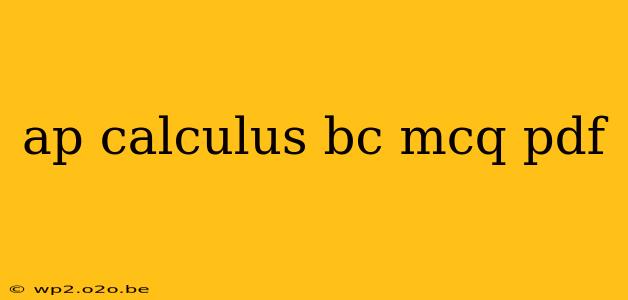Conquer the AP Calculus BC MCQ: A Comprehensive Guide to Mastering Multiple-Choice Questions
The AP Calculus BC exam is a significant hurdle for many high school students, and the multiple-choice section can feel particularly daunting. This guide delves deep into strategies for tackling AP Calculus BC MCQs, helping you not just survive, but thrive, on exam day. We'll explore effective study techniques, common question types, and crucial concepts to master.
Understanding the AP Calculus BC MCQ Landscape
The AP Calculus BC multiple-choice section comprises 45 questions, each worth one point, and you'll have 105 minutes to complete them. This translates to roughly 2.33 minutes per question – a tight timeframe demanding efficiency and precision. The questions test your understanding of both differential and integral calculus, including topics such as:
- Limits and Continuity: Understanding the behavior of functions as they approach certain values is crucial. Mastering techniques for evaluating limits, including L'Hopital's Rule, is essential.
- Derivatives: This forms a major portion of the exam. You'll need to confidently calculate derivatives using various rules (power rule, product rule, quotient rule, chain rule, implicit differentiation) and apply them to solve related rates and optimization problems.
- Applications of Derivatives: Be prepared to analyze functions using derivatives, identifying critical points, inflection points, concavity, and applying these to sketching curves and solving optimization problems.
- Integrals: Mastering various integration techniques, including u-substitution, integration by parts, and trigonometric substitutions, is vital. You'll also encounter problems involving definite and indefinite integrals.
- Applications of Integrals: Understand how to use integrals to calculate areas, volumes, and other geometric properties. Familiarize yourself with concepts like the fundamental theorem of calculus.
- Sequences and Series: This section includes topics like convergence and divergence tests, Taylor and Maclaurin series, and power series.
- Polar, Parametric, and Vector Functions: You'll need to understand how to work with curves defined parametrically or in polar coordinates, along with vector-valued functions.
Effective Strategies for AP Calculus BC MCQs
1. Master the Fundamentals: A strong foundation in pre-calculus concepts is paramount. Brush up on algebra, trigonometry, and analytic geometry before tackling Calculus BC. Solid foundational knowledge will greatly reduce your stress during the exam.
2. Practice, Practice, Practice: The key to success lies in consistent practice. Work through numerous practice problems from various sources, focusing on the areas where you struggle. Analyzing your mistakes is just as important as getting the answers right.
3. Time Management: Develop a strategy to allocate your time effectively. Don't spend too long on any single question. If you're stuck, mark it and come back later.
4. Process of Elimination: If you're unsure of the correct answer, eliminate obviously incorrect options. This increases your chances of guessing correctly.
5. Understand the Question: Carefully read and understand the question before attempting to solve it. Identify the key information and what is being asked.
6. Utilize the Calculator Wisely: The calculator can be a powerful tool, but don't rely on it for every calculation. Develop strong mental math skills to save time.
7. Review Past Exams: Familiarize yourself with the format and question types by reviewing past AP Calculus BC exams. This provides valuable insight into the exam's structure and difficulty level.
8. Focus on Weak Areas: Identify your weaknesses and dedicate extra time to mastering those areas. Don't neglect any topic; even a seemingly small concept can be tested.
9. Understand Conceptual Understanding: The AP exam emphasizes conceptual understanding over rote memorization. Focus on understanding the underlying principles and applying them to various problems.
10. Stay Calm and Focused: During the exam, remain calm and focused. Take deep breaths and manage your stress levels.
Conclusion
Success on the AP Calculus BC multiple-choice section requires diligent preparation, strategic problem-solving, and a solid understanding of fundamental concepts. By following these strategies and dedicating yourself to consistent practice, you can significantly improve your performance and achieve your desired score. Remember that consistent effort and a structured approach are key to conquering this challenging exam.

